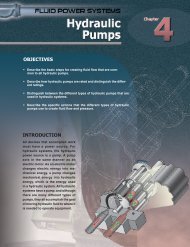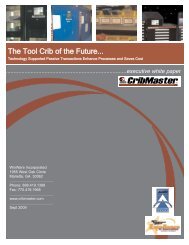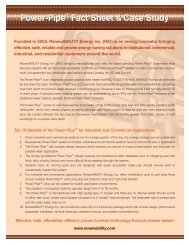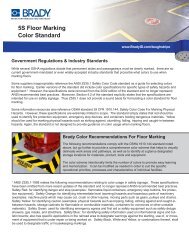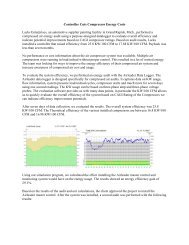POWER UP A WINNER - Plant Services
POWER UP A WINNER - Plant Services
POWER UP A WINNER - Plant Services
You also want an ePaper? Increase the reach of your titles
YUMPU automatically turns print PDFs into web optimized ePapers that Google loves.
HUMan CAPitaL<br />
Tom Moriarty, P.E., CmrP<br />
Maintenance vs. motivation<br />
Who’s Herzberg and why should I care<br />
Frederick Herzberg was a highly respected social psychologist<br />
who developed a theory of employee motivation.<br />
He asked a group of workers to think about times when they<br />
had particularly good feelings about their jobs, and times<br />
when they felt particularly bad about their jobs. Herzberg<br />
also asked them to describe the feelings they had at those<br />
times. What he found was that workers associate distinct<br />
types of conditions as either good or bad situations. His<br />
research separated the factors that influence how people feel<br />
about their work into two categories: maintenance factors<br />
and motivational factors.<br />
Maintenance factors are necessary to maintain a reasonable<br />
level of job satisfaction. Maintenance factors include:<br />
• Policies and administration – the adequacy or inadequacy<br />
of a company’s organization and management<br />
• Supervision – its competency, fairness and ability<br />
• Interpersonal relationships – the bond between people<br />
and their peers, subordinates and supervisors<br />
• Working conditions – the physical environment where<br />
work is performed<br />
• Salary – the employee’s total compensation package<br />
• Personal life – the effect the job has on personal concerns,<br />
including family, recreation, etc.<br />
• Status – the attainment of perks relative to the person’s<br />
position, including parking spots, better computer, etc.<br />
• Job security – the work environment safety and stability<br />
He found that people talk about maintenance factors<br />
when they cite bad feelings about their jobs. The presence of<br />
maintenance factors won’t motivate people to achieve higher<br />
performance, but some minimum level of each maintenance<br />
factor is required to prevent dissatisfaction with the work<br />
environment. Too much dissatisfaction can lead to a longterm<br />
problem and a roadblock to motivation. Some longterm<br />
problems likely to surface include retaining employees,<br />
requests for transfer out of the department, absenteeism, etc.<br />
Motivational factors increase the likelihood that people<br />
will perform better, with less supervision. When people have<br />
good feelings about their jobs, they usually were talking<br />
about motivational factors. Motivational factors include:<br />
• Achievement – personal satisfaction in completing a job<br />
• Recognition – feedback about job accomplishment<br />
• Work – the actual content or the individual’s perceived<br />
value of the work<br />
• Responsibility – control over one’s job, or being in<br />
charge of a team<br />
• Advancement – an upward change in job status<br />
• Growth – learning and trying new skills or experiences<br />
On a daily basis, a supervisor has much more control over<br />
In the day-to-day grind, we often<br />
don’t think enough about enriching<br />
job satisfaction.<br />
motivational factors than maintenance factors. A supervisor<br />
can arrange to give workers a sense of achievement and positive<br />
recognition for good work. A supervisor can empower<br />
team members with greater responsibilities and provide<br />
opportunities for professional growth.<br />
Keep maintenance factors as stable as possible to prevent<br />
dissatisfaction, and load the work environment with motivational<br />
factors. Think of the work environment as a ship. The<br />
ship has to float on the water; a watertight hull is the nautical<br />
equivalent of the maintenance factors. However, a ship<br />
that sits at the pier won’t do much, so you need motivational<br />
factors, a propulsion device and rudder, to maneuver.<br />
In the day-to-day grind of trying to keep ahead of things, we<br />
often don’t think enough about enriching the job satisfaction of<br />
our subordinates. If you lead people, focus on providing at least<br />
one of the following things to everyone on your team:<br />
• Meaningful work – purposeful tasks that are perceived<br />
to be important<br />
• Responsibility – an appropriate level of autonomy in<br />
how a person carries out a task<br />
• Knowledge of the results of their efforts. Provide either<br />
direct feedback about how a specific task was completed<br />
or enable the worker to see how their efforts fit into the<br />
larger picture.<br />
Tom Moriarty, P.E., CMRP, is president of Alidade MER Inc.<br />
Contact him at tjmpe@alidade-mer.com and (321) 773-3356.<br />
www.PLANTSERVICES.com APRIL 2009 19





